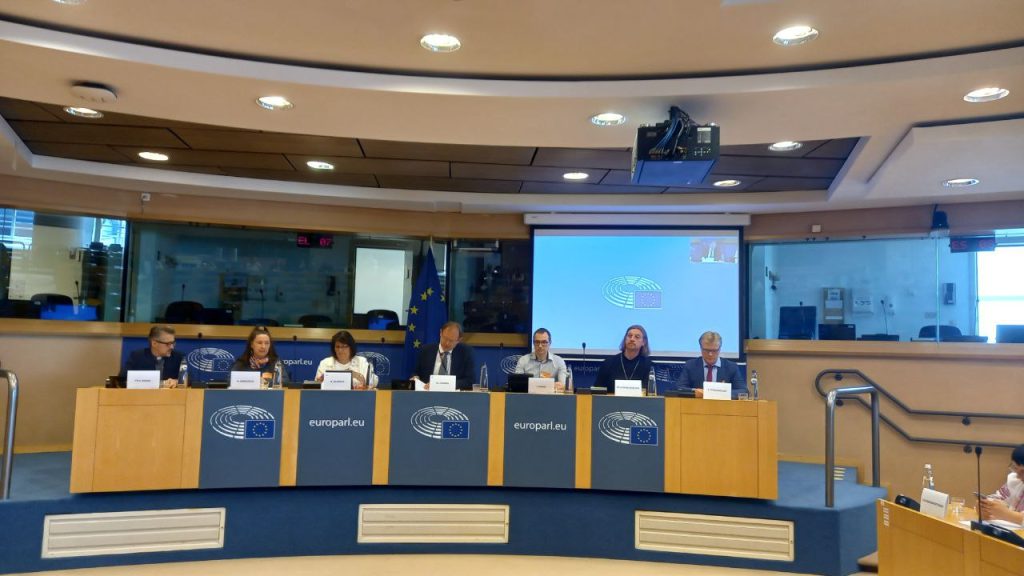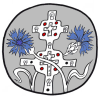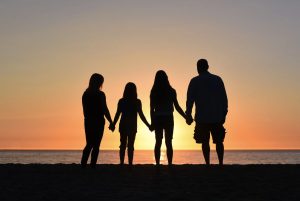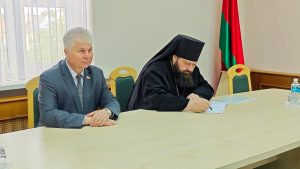Ihar Ivanou. Christian Vision: Monitoring of violations of the rights of citizens and religious communities and associations


Арганізацыя"Хрысціянская візія"
Міжканфесійнае аб’яднанне беларускіх хрысціян, створанае на хвалі мірных пратэстаў 2020 г.
Інфармацыя пра «Хрысціянскую візію» Аб'ява аб заснаванні групы Місія групы Іншыя артыкулы
Ihar Ivanou, publisher, member of “Christian vision” working group.
Life and Faith Under Oppression: Voices from Political Prisoners and the Persecuted Belarusian Christian Communities. Brussels, European Parliament, 31.05.2023.
When the Christian Vision group announced about its existence on 9 September 2020, a month after the presidential elections in Belarus that provoked mass protests and resistance of civil society, it named monitoring of violations of the rights of citizens and religious communities and associations to freedom of religion and belief, freedom of expression and peaceful assembly among its core activities.
Even before the elections, people like Paval Sieviaryniec were detained or arrested; others like Artsem Kushner were forced to leave their jobs. Their persecution was not explicitly focused on exercising their faith (Sieviaryniec was detained for public protesting, Kushner lost his job for wearing a white bracelet, a symbol of the democratic opposition), however, their political and moral choices were inspired by their Christian faith. Those choices provoked persecution from the state and church authorities.
This is an important aspect of Christian Vision’s understanding of its work in the area of monitoring persecutions in Belarus: as well as recording and exposing the facts of persecution, also ensuring that the motivation of protesters — where their faith and religious identity are relevant — is know too.
Over the time, this approach has allowed us to see a bigger and fuller picture of Christians’ and Christian Churches’ response to the political crises and to state-sponsored violence and cruelty, as well as evolution of those responses over the time. It paints a mind-boggling picture of extremely tight control of Lukashenka’s regime over religious communities, in particular — over their hierarchies; and the desperate, often successful but not without painful consequences resistance to the autocratic regime mounted by some lay people, clergy and hierarchs.
Initially, we did not expect it to become what it is now: a massive six-part document detailing hundreds of names and cases. It was growing a way too quicker than anyone of us expected. The Christian Vision group has effectively become a human rights organisation.
The information included in the Monitoring comes via a number of channels. The most important one is based on trusted relationship the Christian Vision members have with compatriots in Belarus — in various communities, at various levels of responsibility and leadership.
In 2020, the independent of the state mass media and social media channels still existed in Belarus; they often reported the materials of interest to the Christian Vision. This source has withered since then.
A significant number of the Christian Vision group members — both laity and clergy — were persecuted too, including detentions and arrests of various duration. They were invaluable sources for a more detailed and more nuanced picture of persecution on the grounds related to faith and religion, and of the situation in Belarusian prisons, including torture and degrading or inhumane treatment
As the time passed and the repressions continued, the Monitoring has developed into the current six-part document.
Its first part covers persecution within religious communities themselves. A significant number of predominantly Orthodox clergy lost their ministries within the Church, were moved to less significant parishes or even banned from exercising their priestly ministry for either being outspoken supporters of the people’s protests or refusing to be outspoken supporters of Lukashenka’s regime. St Elisabeth’s convent in Minsk dismissed from exercising ministry at the convent both priests and lay people.
The administrative persecution and government pressure is the largest section of the Monitoring. From the very beginning of resistance in August 2020, protesters, including Christians, experienced extreme violence from the police, riot police and prison staff. Three brothers – Mikalai, Alaksei and Sergiy Melyanets; all – evangelical Christians – were detained while praying for peace in Belarus in their parked car. Mikalai and Alaksei were beaten with batons and detained. Sergiy was tortured with an electric taser and taken to a hospital. The Directorate for Internal Affairs for Minsk blackmailed Sergiy Melyanets with taking his seven children into care to silence him. Orthodox priest Siarhei Rezanovich, his wife and son were accused of being members of a terrorist group led by Mikalai Autukhovich, a political prisoner. Rev. Rezanovich refused to testify in court. The testimony given by him during the investigation was read out instead, where he allegedly heard from Mikalai Autukhovich about his unspecific intentions to shoot down Lukashenko’s plane from a hand grenade launcher. Rev. Rezanovich was sentenced to 16 years in a high-security colony. His wife was sentenced to 15 years in a penal colony under general regime conditions. Their son, Pavel was sentenced to 19 years in a strict regime colony. They all were tortured during investigation and trial.
The state persecution is applied to the Church institutions and communities too. They have been threatened with cancelling their registration (this would make exercising their religion illegal), their churches and prayer halls were closed down, foreign clergy’s permission for religious work was revoked, receiving charitable assistance from abroad was blocked and even fines imposed for unsanctioned baptisms. The case of outspoken Archbishop Tadeusz Kondrusiewicz received particular publicity when he – a citizen of Belarus – was prevented from returning to the country by immigration authorities. After four months of being forced to live in Poland a a visit of the Pope’s special envoy, Archbishop Kondrusiewicz returned to Belarus and resigned from his ministry almost immediately.
The rights of the detainees, arrested persons and inmates who have been imprisoned for political motives is often substantially worse than others. Often, they are tortured or experience denigrating or inhumane treatment. They are kept in punishment cells for many days and even months. Their access to fresh air, exercise, food parcels, phone calls and visits is severely restricted or even completely withheld. This impacts their health and mental state. Prisoners who are Christians have been prevented from having access to the Bible, subscribing to religious periodicals or having religious objects like crosses. On numerous occasions, Christian Vision appealed to clergy and hierarchs to visit specific political prisoners, and arranged such visits. The group has a programme of humanitarian assistance to political prisoners which is sensitive to their religious needs. It also covers their health needs, e.g. paying for a private dentist where necessary. The groups looks for solicitors willing to work with political prisoners and assists in evacuation to those who are in immediate danger.
Facts of torture, degrading or inhumane treatment in prisons and detention centres are numerous and very distressing. The group issued statements and informed international human rights organisations and media of such cases. Vitold Ashurak’s death under unexplained circumstances in the penal colony deserves a special mention. He was a Roman Catholic believer and activist serving a five-year sentence after a secret trial. Upon release to relatives, Asurak’s body had multiple signs of trauma.
The Christian Vision’s work of monitoring human rights abuses and violence in Belarus is aimed both at our compatriots around the world and at the international community. It ensures the appalling violations are not ignored now and will not be ignored in the future, and their victims have a chance to receive assistance. The Christian Vision’s publications are frequently quoted by the main Belarusian media outside the state control. The Monitoring has been a substantive source for publications in Belarus and abroad, for example by the Norwegian human rights organisation, Forum 18.









